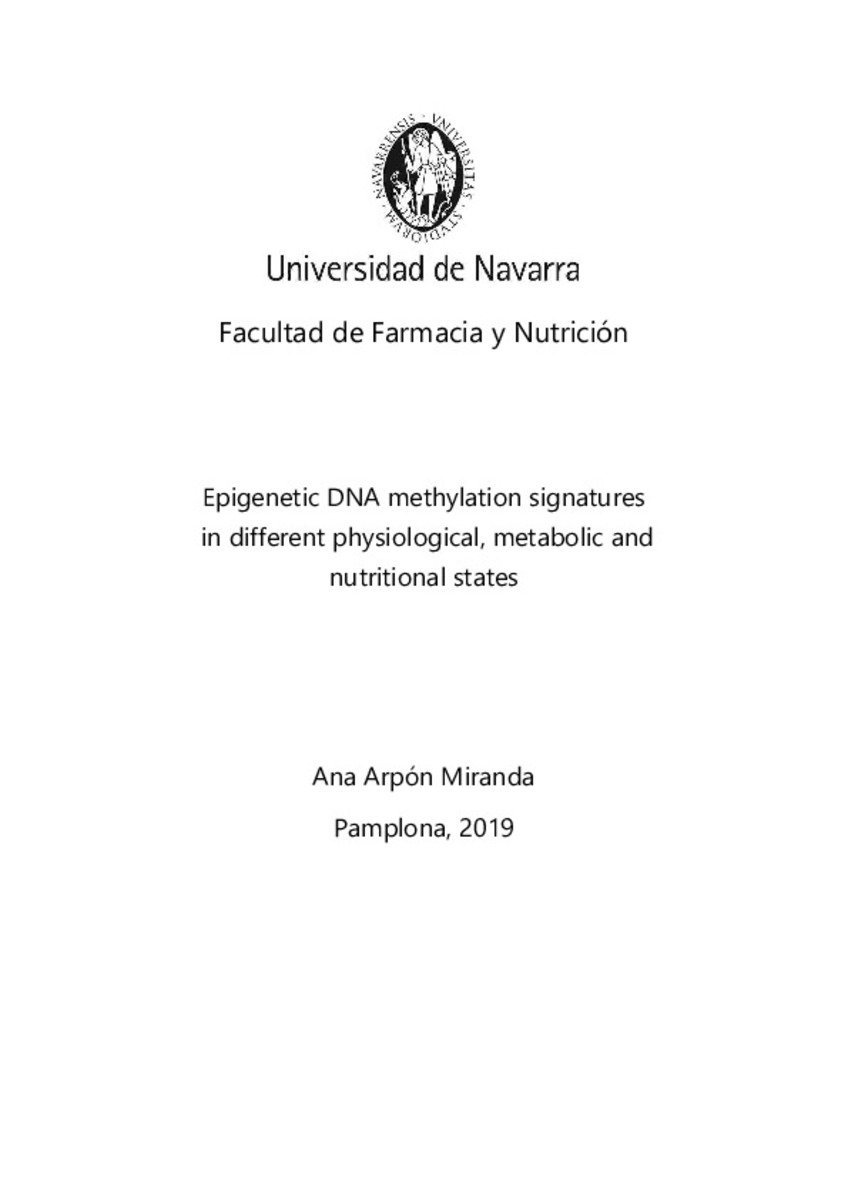Full metadata record
| DC Field | Value | Language |
|---|---|---|
| dc.contributor.advisor | Martinez, J.A. (José Alfredo) | - |
| dc.contributor.advisor | Riezu-Boj, J.I. (José Ignacio) | - |
| dc.creator | Arpon, A. (Ana) | - |
| dc.date.accessioned | 2019-11-07T12:33:52Z | - |
| dc.date.available | 2019-11-07T12:33:52Z | - |
| dc.date.issued | 2019-11-07 | - |
| dc.date.submitted | 2019-10-10 | - |
| dc.identifier.citation | ARPÓN MIRANDA, Ana. “Epigenetic DNA methylation signatures in different physiological, metabolic and nutritional states”. Martínez, A. y Riezu, J. I. (dirs.). Tesis doctoral. Universidad de Navarra, Pamplona, 2019. | es_ES |
| dc.identifier.uri | https://hdl.handle.net/10171/58456 | - |
| dc.description.abstract | Epigenetic signatures are heritable changes that can alter gene expression without modifying the DNA sequence. One major epigenetic mechanism is the methylation of CpG sites, which involves the incorporation of a methyl group into a cytosine that is adjacent to a guanine. DNA methylation patterns can be influenced by environmental factors and can change stochastically as a result of ageing, and thereby, modulate gene expression. Modifications in DNA methylation marks can alter the susceptibility to certain diseases and health impairments, including neurological disorders, obesity, type 2 diabetes and cardiovascular disease. In this context, DNA methylation alterations have emerged as promising biomarkers for disease screening, detection, and prediction, in addition to being potential targets for the development of new therapeutic approaches. Thus, the general objective of the current research is to identify DNA methylation patterns associated with different physiological, metabolic and nutritional states that might contribute to the development of biomarker panels and potential therapeutic targets. In order to achieve this, epigenome-wide association studies were performed in different populations to determine candidate CpG sites related to factors and features that could influence and/or be associated with DNA methylation. These included prematurity, a Mediterranean diet, insulin sensitivity and resistance, abdominal obesity and epigenetic age. Altogether, the results of the current thesis demonstrate that alterations in DNA methylation marks depend on the screened physiological, metabolic and nutritional state of the individual. Due to the plasticity of the epigenetic system, environmental factors can influence DNA methylation signatures, both during the first stages of life and during the adulthood. As such, prematurity and nutrition are two determinant factors of DNA methylation levels. The findings of this investigation revealed that preterm newborns exhibit lower levels of methylation of a CpG located at the SLC6A3 gene, which is related to neurodevelopment. Regarding nutrition, following a Mediterranean diet was associated with alterations in the methylation of genes related to inflammatory and metabolic pathways, where fat quality may also play a role. Moreover, some DNA methylation signatures were associated with insulin sensitivity, insulin resistance and abdominal adiposity, supporting an influence of epigenetics on metabolic pathways and in the onset and progression of metabolic diseases. For instance, LPL and CTNND2 were highly associated with insulin sensitivity, able to accurately discern between subjects with low and high insulin sensitivity values. Concerning insulin resistance, four CpGs located at genes involved in glucose- and insulin-related pathways, including the SH3RF3 and MAN2C1 genes, were capable of distinguishing low and high insulin resistance levels. On the other hand, differential DNA methylation values were also found for subjects with and without central obesity, which could be discriminated by four CpGs in women (c13orf36, ZC3H12D, MYO9B, KCNG3) and one in men (TCP11L1). Lastly, ageing was also related to changes in DNA methylation, confirming that an unhealthy metabolic state accelerates the epigenetic age, possibly leading to early health deterioration. Overall, this research provides new insights into the underlying epigenetic mechanisms associated with prematurity, metabolic diseases and ageing, suggesting different CpG sites as putative biomarkers for diagnosis and prognosis or as potential therapeutic targets for the prevention and treatment of chronic diseases. | es_ES |
| dc.language.iso | eng | es_ES |
| dc.rights | info:eu-repo/semantics/openAccess | * |
| dc.subject | Genética humana | es_ES |
| dc.subject | Metabolismo humano | es_ES |
| dc.subject | Enfermedades de la nutrición | es_ES |
| dc.subject | Materias Investigacion::Ciencias de la Salud::Genética | es_ES |
| dc.title | Epigenetic DNA methylation signatures in different physiological, metabolic and nutritional states | es_ES |
| dc.type | info:eu-repo/semantics/doctoralThesis | es_ES |
Files in This Item:
Statistics and impact
Items in Dadun are protected by copyright, with all rights reserved, unless otherwise indicated.






